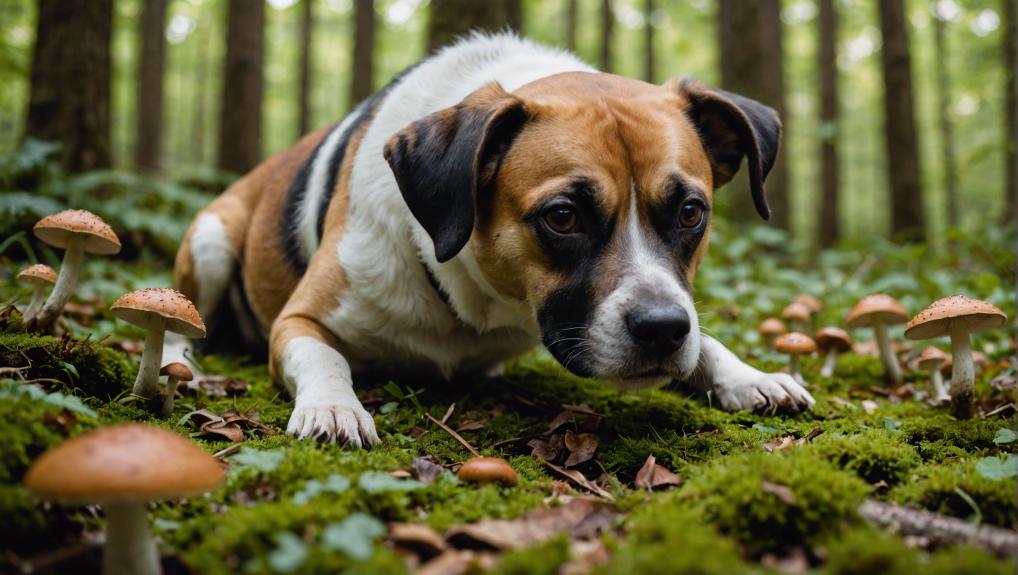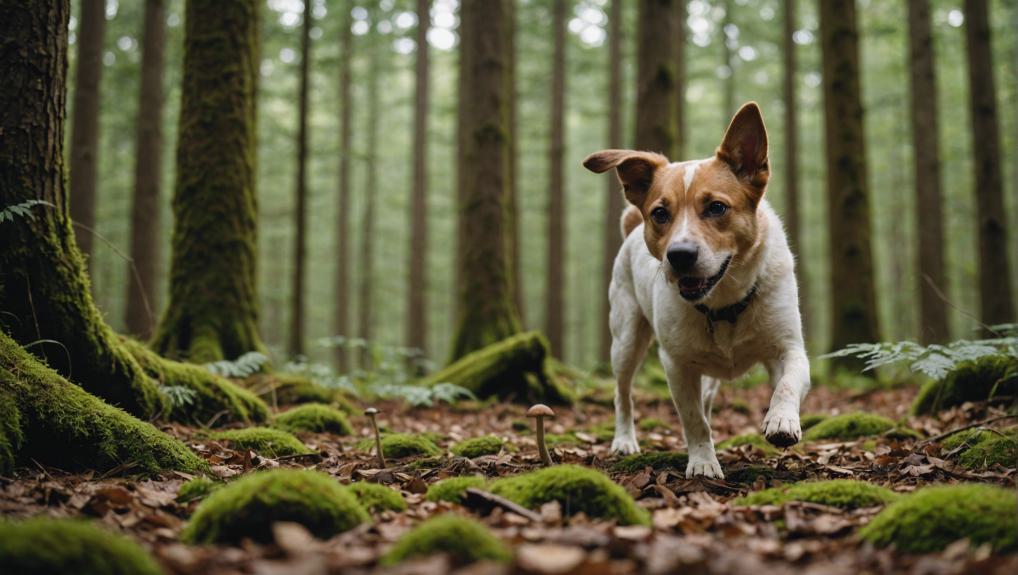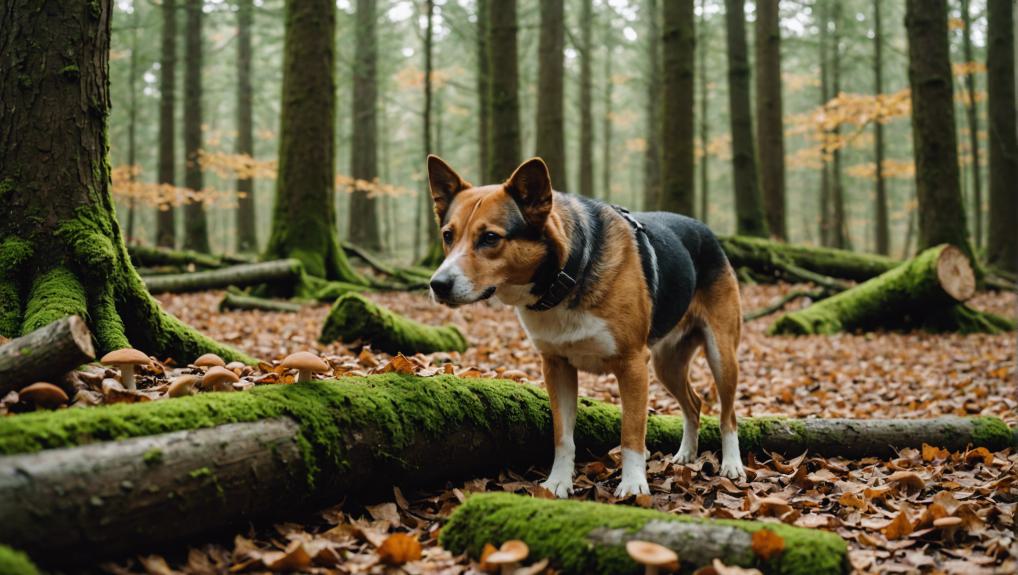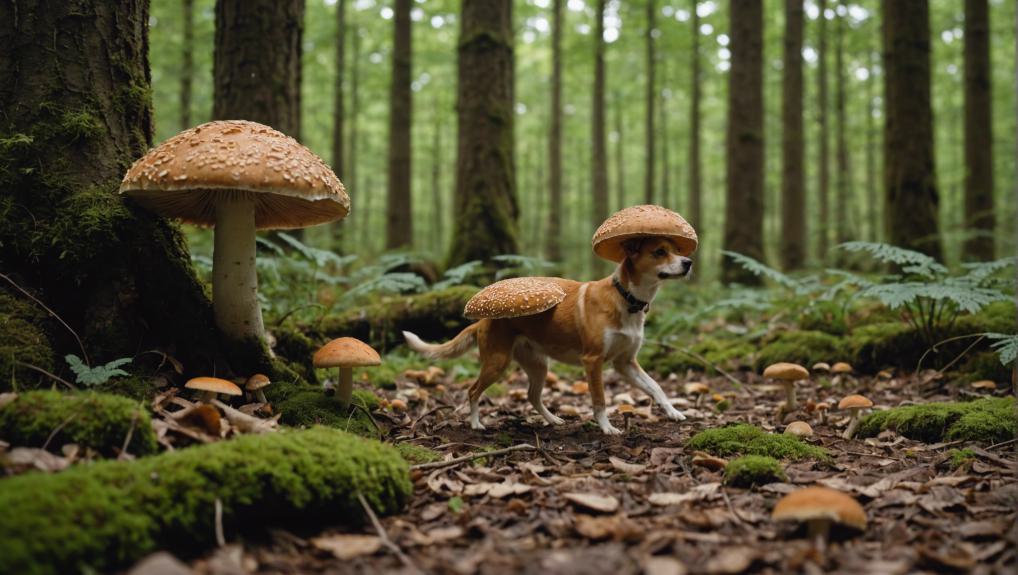How to Train a Dog to Find Mushrooms? Ultimate Guide
To train your dog to find mushrooms successfully, create a quiet, familiar setting with various terrains. Introduce the scent of fresh mushrooms gradually, focusing on morels. Use consistent cues and positive reinforcement techniques to motivate your dog. Engage in drive-building exercises to enhance focus. Practice in different environments for adaptability and safety. Celebrate small achievements, be patient, and set realistic goals. Implement consistent training routines with rewards for accuracy. For more detailed insights on refining your dog’s mushroom hunting skills, explore the extensive training techniques and safety measures in this ultimate guide.
Choosing the Right Training Environment
In choosing a training environment to teach your dog to find mushrooms, opt for a quiet and familiar setting to minimize distractions. This calm setting will help your dog focus on the task at hand without being overwhelmed by external stimuli.
Make sure the environment offers a variety of surfaces and terrains, mimicking real-world conditions for mushroom hunting. Familiarizing your dog with the specific scent of mushrooms in this chosen environment is essential for successful training.
Selecting the Ideal Mushroom Scent
For best training results in teaching your dog to find mushrooms, selecting mushrooms with a strong, distinct scent is crucial. When selecting the ideal mushroom scent for training, consider the following:
- Opt for fresh mushrooms: Fresh mushrooms have a more potent aroma that dogs can easily detect, making them ideal for training sessions.
- Choose morel mushrooms: Morel mushrooms have a unique and easily recognizable scent that can help your dog differentiate them from other scents.
- Maintain consistent scent: Using the same type of mushroom scent consistently during training will help your dog associate it effectively with the target item, avoiding confusion.
Establishing Clear Communication Channels

To establish clear communication channels with your dog for mushroom hunting training, focus on using consistent body language cues and vocal commands.
Positive reinforcement techniques play a key role in reinforcing this connection, so be sure to reward desired behaviors promptly.
Regular practice and maintaining consistency in training methods will help build a strong rapport between you and your dog, enhancing the effectiveness of your communication channels.
Body Language Cues
Establishing clear communication channels with your dog during mushroom hunting training involves using consistent body language cues. To effectively communicate with your furry companion, pay attention to the following:
- Positive Reinforcement: Use your body language cues to reward your dog when they exhibit behaviors that lead them to find mushrooms.
- Observation: Watch for subtle changes in your dog’s body language to understand their progress in scent work and mushroom hunting.
- Adaptation: Adjust your own body language to guide and communicate with your dog during training sessions, ensuring a harmonious training experience.
Vocal Commands
When training your dog to find mushrooms, make sure that your vocal commands are consistent and distinct to establish clear communication channels. This helps your dog understand what is expected and reduces confusion during the training process. Use positive reinforcement techniques such as treats to reinforce the desired behavior when your dog follows your commands correctly. Teaching your dog to sniff out mushrooms relies heavily on their sense of smell, so clear vocal cues are essential for guiding their actions effectively. By practicing vocal commands in various environments, you can guarantee that your dog can respond appropriately no matter where you are hunting for mushrooms. Consistent use of vocal commands strengthens the communication between you and your dog, making the training process smoother and more successful.
| Vocal Commands | Importance | Example |
|---|---|---|
| Consistency | Establishes clear communication | ‘Find mushrooms’ |
| Distinctness | Reduces confusion | ‘Sniff for mushrooms’ |
| Positive Reinforcement | Encourages desired behavior | ‘Good job, find mushrooms’ |
| Practice | Ensures effectiveness in different settings | ‘Search for mushrooms here’ |
| Communication | Strengthens bond with your dog | ‘Mushrooms, go find’ |
Implementing Reward-Based Training Techniques
Reward-based training techniques in mushroom hunting involve utilizing positive reinforcement methods like treats, praise, and play to encourage your dog’s desired behaviors. To effectively implement these techniques, consider the following:
- Motivation: Dogs are naturally motivated by rewards like treats or toys. By associating successful mushroom searches with these rewards, you can keep your dog engaged and excited about the task.
- Consistent Rewards: Providing consistent rewards for correctly identifying mushrooms helps reinforce this behavior. This repetition is key to improving your dog’s hunting skills over time.
- Bond Building: Reward-based training not only enhances your dog’s skills but also strengthens the bond between you and your furry companion. This bond improves communication and cooperation during your mushroom hunting adventures.
Enhancing Focus and Drive in Your Dog

To enhance your dog’s focus and drive in mushroom hunting, engage in drive-building exercises that keep them motivated and tireless during training sessions.
Practice teasing and rewarding your furry friend with the target mushroom to improve their concentration and attention to the task at hand.
Encouraging scratching behavior as a signal for finding mushrooms can further boost their drive and determination in the hunt.
Focus Training Techniques
Boost your dog’s focus and drive by engaging in drive-building exercises to enhance their motivation and tirelessness in searching for mushrooms. To improve your dog’s focus training techniques, try the following:
- Tease and Reward: Practice teasing your dog with a mushroom-scented ball and reward them when they show focus during training sessions.
- Consistent Cues: Use consistent cues and feedback to reinforce the association between scratching behavior and finding mushrooms.
- Scent Training: Implement scent training by starting with rubbing mushrooms on a ball and then shifting to unscented balls for practice.
Building Canine Motivation
Engage in various drive-building exercises like tug-of-war and fetch to enhance your dog’s motivation and focus in training sessions. Use high-value treats to reward and reinforce your dog’s concentration.
Incorporate scent games to boost their olfactory skills, making them more motivated. Keep training sessions short and frequent to maintain your dog’s interest and focus.
Positive reinforcement is key in building a strong bond with your dog, increasing their drive to find mushrooms. By teaching your dog through positive experiences, you can enhance their motivation and drive in learning new tasks.
Incorporating these techniques into your dog training routine will help teach your dog to focus and stay motivated, making mushroom hunting a rewarding activity for both of you.
Gradually Introducing Mushroom Challenges
Introduce mushroom challenges gradually to acclimate your dog to different scent detection scenarios in a controlled environment. This step-by-step approach will help your dog develop the necessary skills to find mushrooms effectively.
Here’s how to do it:
- Start by teaching the dog to understand the type of mushroom scent you want them to find.
- Gradually increase the difficulty by hiding mushrooms in various locations and depths to enhance their scent detection abilities.
- Reinforce positive behavior by rewarding and praising your dog when they successfully find the mushrooms. This encouragement will motivate them to continue improving their skills in mushroom detection.
Consistent Practice for Skill Development

To enhance your dog’s ability in finding mushrooms, consistent practice is essential for skill development. Regular training sessions are vital as they reinforce your dog’s capability to identify mushrooms effectively.
It’s beneficial to practice in various environments and conditions to enhance your dog’s proficiency in mushroom hunting. Through repetition and reinforcement, you can solidify your dog’s grasp of the task at hand.
Continuous training guarantees that your dog remains engaged and sharp in accurately identifying mushrooms. By maintaining a consistent practice routine, you’re actively contributing to the development and improvement of your dog’s mushroom hunting skills.
Frequently Asked Questions
How Do I Teach My Dog to Find Mushrooms?
To teach your dog to find mushrooms, associate their smell with treats, start training in a specific area, use consistent signals, a command word, and praise progress. Gradually increase distance and vary locations for enhanced skills.
Can You Train a Dog to Hunt Morels?
You can train a dog to hunt morels by capitalizing on their keen sense of smell. Utilize their unique abilities and practice with dedication. With patience and repetition, your furry friend can become an expert in finding these elusive mushrooms.
What Is the Trick to Finding the Mushroom?
To find mushrooms, focus on training your dog to recognize their specific smell and indicate when they’re found. Practice indoors and outdoors with positive reinforcement. Consistency and rewards are key to improving your dog’s mushroom hunting skills.
Are Chanterelle Mushrooms Poisonous to Dogs?
Chanterelle mushrooms are not poisonous to dogs and can be safe for them to eat. They provide nutrients like vitamin C and potassium. However, always make sure they are sourced safely. If unsure, consult your vet.
Conclusion
To sum up, training your dog to find mushrooms requires dedication, patience, and a strategic approach. By creating a conducive training environment, selecting the right scent, and establishing clear communication, you can set your dog up for success.
Reward-based techniques, focus enhancement, and consistent practice are key elements in developing this specialized skill. With gradual challenges and perseverance, you and your furry companion can start a rewarding journey of mushroom hunting together.
Start training today and watch your dog’s skills blossom!

